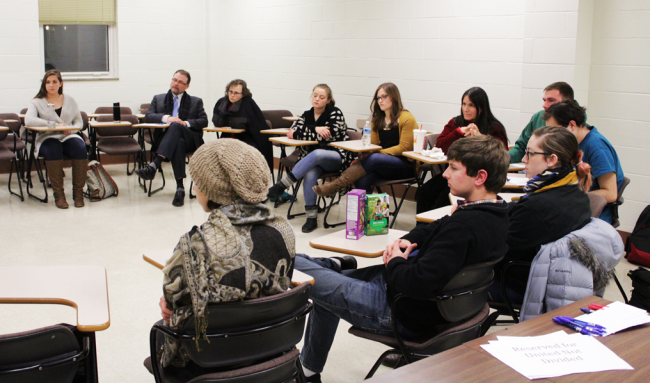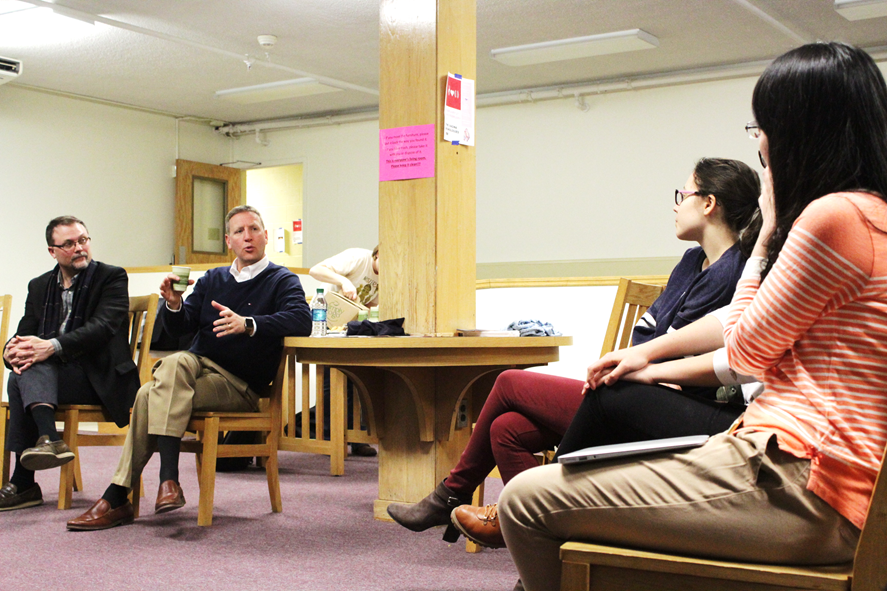You have /5 articles left.
Sign up for a free account or log in.

Students and faculty members at a United Not Divided event at Juniata College
Devon-Mikal Weaver
Everyone at Juniata College was talking about race. Everyone, it seemed, but the professors.
While race was rarely discussed in class, it was everywhere else: students read about Black Lives Matter. They read about the protests at the University of Missouri at Columbia. They watched as campus activism spread across the country.
And they wondered: How do we, at a liberal arts college of 1,600 students, most of whom are white, fit into the conversation?
But in class, their professors were reluctant to talk about that question. Some didn’t know how to fit conversations about race and diversity into busy syllabi. Others knew the issues are emotionally charged and worried about saying the wrong thing.
“They didn’t know how to respond,” Juniata Provost Lauren Bowen said. “They’re not a monolith; they don’t speak with one voice. They didn’t want to be insensitive.”
Besides, some faculty members wondered, what could students learn from them? What could a physics professor say about race in America?
“They thought students were looking to them to be the experts,” Bowen said. “For some of them, it’s not their field. They feel ill equipped.”
Still, students wanted more support. Activism takes energy, they told Bowen. It’s hard to grapple with racial tensions -- and it’s hard to balance activism with a full course load. Why wouldn’t their professors acknowledge what they were going through?
‘Stuck in Our Own Roles’
In periods of turmoil, many campuses opt for the all-campus assembly: students file into large auditoriums with mikes in the aisles, and anyone with something to say is free to talk.
But Juniata, a tight-knit campus in rural Pennsylvania, decided against this approach. (The college's undergraduates are 71 percent white, according to federal data.)
“It just hasn’t been our way,” said James Troha, Juniata’s president. “We try to have smaller conversations where we look each other in the eye.”
So instead, the college made a concerted effort to encourage conversations about race and equality in small, informal settings, including the classroom. That’s when Troha and Bowen realized some professors -- especially those in fields unrelated to race and equality -- felt unprepared.
“Sometimes people are reluctant to have these conversations without adequate training. They don’t want to make things worse,” Troha said. “Our job was to say, ‘If you feel ill equipped, we can provide the necessary training.’”
In the spring, two Juniata professors organized a three-part equity and justice retreat. Professors who attended learned how to have controversial conversations in the classroom and how to encourage inclusive classrooms.
“Sometimes we walk around with this veneer: ‘I’m the faculty. I’m not supposed to make mistakes,’” said Grace Fala, a communications professor at the college who helped lead the training. “We get stuck in our own roles.”
As educators, advisers and mentors, professors are trained to deal in analysis and expertise -- not empathy and recognition. But that, Fala said, is what students often need: to be listened to.
During the training, professors learn to listen to disruptions that seem controversial or tense but that ultimately fuel engagement and learning. They learn to respond to questions with honest responses, such as, “I’m unsure right now,” or, “Frankly, I’m uncomfortable, too, so let’s talk about it.”
They also learn to define their role in difficult conversations -- are you encouraging the discussion? Are you directing it? -- and to be clear about a conversation’s purpose.
Other lessons concern logistics: “A lot of it has to do with space and time,” said Celia Cook-Huffman, a professor of conflict resolution at Juniata and a training leader. “If you’re teaching in a science class or a math class, where and how do you create space for these conversations?”
Over time, the goal is to teach professors a skill set. Faculty members typically are comfortable debating facts and evidence, the training leaders said, but racism and diversity are emotional topics. To better help students, professors at the college learn to develop their emotional knowledge.
What does that look like? Fala uses words like “authenticity,” “honesty” and “narrative” -- all skills, she said, “that you don’t always talk about in academic research.”
Facilitate, Not Dictate
Alison Fletcher talks about race all the time in her classes. A history professor who studies the British empire, she believes those discussions help students get outside of their own heads. Learning how race and racism informed the past, she said, students can think about those issues with the advantages of distance and context: they develop a language to talk about race, and they don’t feel their sense of identity is threatened.
Still, Fletcher has been rethinking her syllabus.
She knows students want to talk more about these issues in class, and she’s trying to oblige. “After this blew up,” she said, “I thought more reading would help.”
When tensions flared in the fall, students would come to Fletcher’s office wanting to talk about what was happening and what they could do. It was clear to her that students needed support.
But the goal, Troha said, was to provide that support without forcing a conversation. He wanted to help students explore their thoughts and ideas while letting them control the conversation.
Throughout the year, Troha hosted a series of conversations called Fireside Chats. Located in residence hall lounges, the chats were an attempt to meet students on their turf. “The great thing about these evenings is there is no agenda,” Troha told students at a chat in February. “The agenda is yours.”

That’s Troha’s philosophy: students should discuss what’s on their minds without being forced to do so. Faculty and staff can help facilitate those conversations -- but they shouldn’t dictate them.
That was also the idea behind United Not Divided, a series of student-led conversations that began at the college last winter. Students who attended broke into small groups, with each group including a faculty or staff facilitator.
Fletcher was a facilitator. In her group, students discussed the Black Lives Matter banners that had recently gone up on campus.
“The first two young people said they really didn’t understand banners that had gone up,” she said. “One person said they shouldn’t have gone up. Another student said, ‘I was one of the people that put them up.’”
Intimate conversations like this subdue anger, Fletcher said. Already, she’s feeling the tension on campus diffuse.
But at the same time, she wondered, what if it diffused too quickly?
“Things come to a head,” she said. “Lots of conversations are started, and then exams happen, and everybody goes home.”




